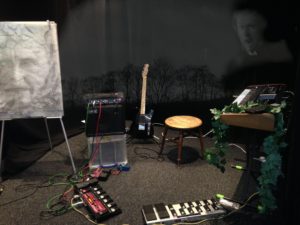I’m not sure what I want to say here. If I was ten, and sitting in a classroom in England or Wales, two countries that have imposed a straitjacket of uniformity across its schools, I would have to know exactly what I wanted to say, probably plan it before hand, paragraph by paragraph, with a tick list of connectives and ‘interesting vocabulary’ and suchlike. Teachers too have to know exactly what they plan to teach, what it is they expect children to learn from a particular session. It’s not surprising that at the end of the day, if there’s time, most teachers I’ve ever worked with like to read to their pupils, it winds things down before the headlong rush to the school gates. But no teacher I’ve ever known ever considers what those children are learning as they listen, eyes fixed, to whatever world is created in their minds as a teacher reads aloud. Yet, for the rest of the time many teachers subscribe to current dogma, that we must teach the curriculum, not the child. Focus on the needs of the country, or the economy, or your career, or whatever it is that is your guiding principle. But it’s rarely what the child wants.
I have two children, and I like to imagine what would have happened if, when they were not yet talking, I had created a list of what I expected each of them to learn on a particular day, what vocabulary, what things I would point at, what books we would read together, or games we would play.
Because every parent knows is that every child is very different and each one needs a radically different diet of stimulation, and it is often the child that will lead. If your son points to a flower, or your daughter to the piano, you do not ignore them and direct their attention elsewhere, as if you have a prescription for how they learn. But nevertheless this is what happens in school. We teach the curriculum not the child, and more and more the curriculum is suited to one sort of child and one vision of how the future will be. According to mainstream educational policy it involves lots of writing, maths and IT software that will be out of date before the summer holidays. We don’t know what the future holds – although many would say its a future where robots take over and we humans are left to write blogs like this, musing over the way things could be.
However. This is a blog about composing music, because I’ve done a lot of it in my time and it’s just about the best thing there is. Schools can’t afford to much of it any more. Which is just as well, as they’d probably put the kids off music for life.
When I compose music I often have no idea what it is I intend to do. I have a working method, or a few to choose from, but never any clear idea of where I am heading for. I know my route, but not my destination. I try something, and if it works, I continue. If it doesn’t, I don’t.
What the phrase ‘it works’ means here is not obvious. It’s a sense that I’ve found something that’s meaningful, and which isn’t a cliche. I just know when its right. Like teaching and parenting, composing music is an art, not a science, there are no clear rules.
I learn just as an infant learns, I am drawn to whatever interests me.
My favourite method of composition is to construct a series of musical phrases, each one a layer of sound on sound, and each one somehow related to the others. When these phrases are amassed, I begin moving them around, seeing which goes where. It’s a bit like furnishing a room on an unlimited budget: choose chairs, sofas, table, light fittings and so on that work together, but don’t expect to know how it’ll all work until it’s all there to play around with. And then you might have to leave more space than you expected, move an armchair to the spare room, add more cushions, find somewhere to store all those books.
I like making music for this very reason. It’s a constant battle between leaving something open ended, and drawing things to some sort of conclusion. It keeps the mind alive, curious, keen. The desire towards completing a polished piece is one thing, but the process is another. It’s art, it’s alchemy, it’s great fun.
I’ve worked on ‘From Ages to Ages’ for almost twenty years, and, at the same time, experimented by creating smaller compositions, always looking for something, wanting to find that elusive alchemy.
And here are some of those pieces, created over the last five or six years, ranging from simple improvisations to complex, sometimes muddled collages of sound.
